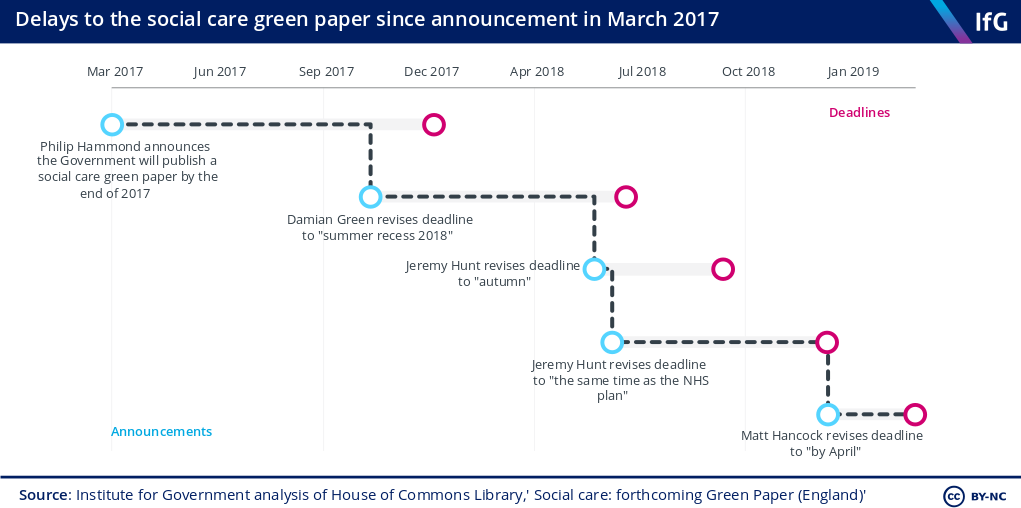The Government must not continue delaying the social care green paper
The fifth delay to the publication of the social care green paper is a cause for concern.
The fifth delay to the publication of the social care green paper is a cause for concern, writes Graham Atkins.
Once again, the Government has missed its self-imposed deadline for publishing the social care green paper. Health Secretary Matt Hancock had promised in January that it would be published “before April”. This failure to publish is the fifth occasion that the green paper has been delayed in just over two years.
The green paper has become an object of ridicule, but the Government’s constant foot-dragging is no laughing matter. Ongoing prevarication has already created serious problems and is storing up more for the future. Our analysis from Performance Tracker – produced in partnership with the Chartered Institute of Public Finance and Accountancy – shows that adult social care cannot keep operating as efficiently as it did last year – let alone hope to meet future demand without a significant boost to funding. The latest delay must be the last.

Pressures have mounted since the initial green paper announcement
Since the Government first announced the green paper, the pressures on publicly-funded adult social care – which is rationed to those most in need who meet the financial means test – have only intensified.
Demand for social care has increased. Independent academic analysts have estimated that the number of older people in need of and eligible for publicly-funded adult social care increased by 2%, while the number of working-age adults in need of and eligible for publicly-funded adult social care increased 3.7%. At the same time, the number of state-funded long-term care packages actually declined 2% after 2016/17.
Staff turnover increased three percentage points after 2016/17 – making it harder for homecare providers and care homes to maintain quality of care. Some providers have become financially unsustainable – where their revenues do not cover the cost of providing services. The Competition and Markets Authority estimate that councils are paying 10% less than the total cost of care home places.
It is increasingly clear that councils cannot maintain the scope and quality of social care on their current level of spending.
Delays and emergency cash have not addressed the underlying problems in social care
In response to rising pressure, the Government has injected £1.04bn additional emergency funding since announcing the green paper and eased some immediate pressures. But emergency cash will not tackle underlying recruitment problems, or perceptions that the system is unfair. With no financial certainty, councils and the providers they purchase services from will struggle to invest in schemes to improve staff retention. And emergency cash without reform doesn’t change the eligibility problem: the current system imposes heavy burdens on individuals who require very expensive long-term care but don’t pass the financial means test for publicly-funded care.
The Government must publish the green paper
A reformed funding system is required to give councils financial certainty and let them to address underlying problems.
Delays to the green paper make it impossible for councils to plan ahead. There is still no indication of the shape of reform, with many options having been considered. The Government could implement a ‘cap’ to limit the total amount any individual would have to pay for care before becoming eligible for public funding. Or it could make the ‘floor’ more generous by increasing the amount of money any individual would be allowed to keep before qualifying for public funding. Alternatively it could implement a compulsory insurance system akin to Germany and Japan, or create a partially state-funded system free at point of use, as Scotland has done.
The Government must make a choice – and make one as soon as possible. Publishing the green paper is a vital first step.
A cross-party inquiry remains the Government’s best chance of lasting reform
But the green paper is a consultation and will only set out options for reform. To implement reform – which will involve difficult choices about how to raise money to pay for services – the Government must then set up an independent, cross-party inquiry on social care funding, as we recommended last year. This would be the best mechanism to build the public and parliamentary support needed to deliver change, with the last major attempt to reform social care funding – the Dilnot Commission – failing to build the high-level political support that could have seen it implemented. This mistake cannot be repeated.
Then, once political support is secured, legislation will have to be passed. Reforming social care is complicated. It requires time and political capital. As yet another deadline is missed, the Government is squandering both.
- Topic
- Public services
- Keywords
- Social care
- Department
- Department of Health and Social Care
- Publisher
- Institute for Government